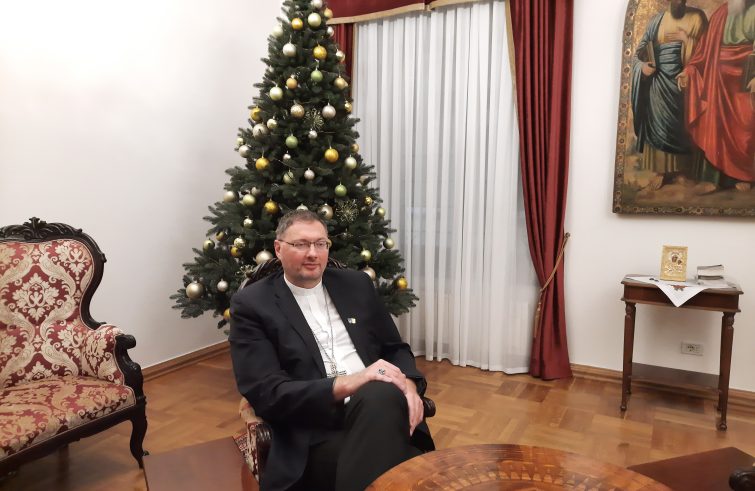
“In Kyiv it feels as if the war has become part of everyday life, as if it were a normality. But it is not normal.” Msgr. Visvaldas Kulbokas, Apostolic Nuncio to Ukraine, describes the atmosphere in the Ukrainian capital this Christmas season. “It is not normal even in times of peace,” he adds, “because the situation is never completely calm. We are preparing to experience Christmas in this way, in a critical context that nevertheless enhances its spiritual dimension and sheds light on who Jesus is, the Prince of Justice and Peace.”
“Many people, believers and non-believers alike, are looking forward to Christmas as a time to receive the grace of peace and the gift of life. War causes so much suffering, so many deaths, so many wounds. So there are great expectations.”
How is life lived on the ground?
We live each night and each day as if they were separate moments, because the situation is precarious. We never know if tomorrow will be the same as the day before. It depends on how many rockets are fired, how many drones fall on the city. You cannot be sure that things will go according to plan. For two years now, we have all been facing an overwhelming uncertainty.
This year marks an important innovation: for the first time, the Greek Catholic Church will celebrate Christmas not on 7 January, but on 25 December. How should this be interpreted?
I would not put too much emphasis on the date. However, it is an indication that we are united even externally.
On Sunday, relatives and friends of the Ukrainian prisoners took to the streets of Kyiv to call for their release and to demand that all possible efforts be intensified to bring them home. But in concrete terms, what can the Holy See’s diplomacy do for them?
This is a big problem. Every day, when I celebrate morning Mass, I entrust my personal prayer to the prayers of those who are suffering. There are so many of them. It is not only the military who are imprisoned, but also many civilians, and this is a huge problem. Among them are the two Greek Catholic Redemptorist priests captured in Berdyansk, who have been imprisoned for over a year. I am in contact with the associations of the prisoners’ families, who have told me stories of great suffering, terrible stories. The families have no idea where they are or whether they are alive. The prisoners have no drinking water. Not to mention the lack of food, the mistreatment, the poor conditions in which they are forced to live, and much more. This issue, that of prisoners, children and humanitarian aid, is an important commitment that Pope Francis himself insists on, either by highlighting these issues and drawing attention to them, or by appealing to the relevant authorities. Unfortunately, little progress has been made so far. But this does not mean that we should stop making these requests. We are believers and we have no right to give up.
People’s hearts can always change. Including the hearts of those to blame for such evil.
We don’t know when, but we know that by unceasingly knocking on the doors, one day these doors will open. And we believe this all the more because we are believers and, besides our concrete efforts, we entrust ourselves to God’s grace in prayer.
Maria Lvova-Belova, Commissioner for Children’s Rights of the Presidency of the Russian Federation, has recently released a report indicating that some minors have been identified so far. Does this mean that some progress is being made with regard to deported Ukrainian children?
We are beginning to see some signs of progress, which means that there are some small breakthroughs. It shows that it is always better to do something than to do nothing. And we have been informed of some proposals regarding how to proceed. Even though small, it is certainly a step forward. In the present, difficult circumstances, we must leave no stone unturned.
In a context where peace, at least in the eyes of the public, seems an impossible goal, how do you see the situation? Two years after the outbreak of this war, are you more optimistic or pessimistic?
I am not in a position to comment or speculate, also because the current state of the war is that we are navigating the situation according to the evolving circumstances, we are living day by day and therefore it is difficult to make any overall considerations.
Of course, the longer the war goes on, the greater the difficulty of communication.
War damages communication channels, it destroys, and it hardens people’s hearts. There is also increased suffering, but paradoxically this is what drives people to seek a way out of the war. My personal reflection is based on what the prophets of the Old Testament said: we cannot trust human powers, we must trust God who proclaims justice, respect and peace. That is why, in this search for peace, I have greater faith in the efforts of the Churches and religions.
What is the strength of Pope Francis?
The strength of a Pope is faith. Faith means that even if the whole world says no, the Pope will try and will not stop trying. But with faith you also have to have a good measure of humanity. In the same way, prayer has to be persevering, because for God, all our prayers are always new, even if to us they are always the same and are repeated day after day. For God, each and every prayer is new. And that is the strength of the Pope and of the Church.









